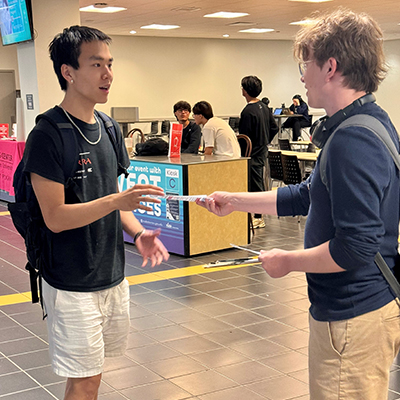In This Story
Each of the 25 locations in Fairfax County to cast a vote on November 5 saw a drop in voter turnout—nine percentage points lower, on average—compared to 2020. But one precinct fared better than the rest: The polling station at Merten Hall on George Mason University’s Fairfax Campus.
The George Mason decline in voters was 0.98 percentage points, well below the average drop-off.
The higher-than-average turnout was no accident, said Schar School of Policy and Government associate professor Jennifer N. Victor, who managed a study on how to encourage student voting. In fact, the get-out-the-vote effort was a well-coordinated and lengthy campaign that involved dozens of on- and off-campus stakeholders.

Not the least of the others was “a small army of about 75 students who spent hours registering students, giving presentations in classrooms, and canvassing common areas with positive messages about voting,” she said.
One of those students was Hannah Kohler, a first-year government and international politics (GVIP) major, with a concentration in political behavior and identity politics.
“It was very important to make sure George Mason students were registered and made it to the polling place on election day because college students face the most barriers to voting than any other population of voters,” said the New Philadelphia, Ohio, native.
Those barriers are due to lack of connection with a new community having just moved, too few knowledge of candidates, the list goes on, she said. “However, George Mason made it much easier for students to vote on election day by giving students the day off. We did a lot of tabling events to get students registered leading up to the registration deadline and on election day we had multiple groups of ambassadors at dining halls and at Merten Hall urging students to go vote.”
Throughout the first semester, said first-year GVIP major Shanti Sharma, “whether through tabling in Wilkin’s Plaza or visiting classes to give presentations, the first-year Democracy Lab [Learning Community] was dedicated to providing voter registration information and resources to our peers. By encouraging others to register to vote, we helped give the student body—a new generation of voters—a voice in the community that was not only heard but also impactful.
“In the coming years,” the Winchester, Virginia, native said, “I hope to see even more students at Merten Hall step up, vote, and make their voices count.”
The effort to encourage student voting continued all the way to Election Day. That morning, Kohler and other student ambassadors canvased students at Ike’s Dining Hall in Presidents Park “asking students if they had voted and informing them of the polling place in Merten Hall where they could go vote—and even register if they had not yet done so,” she said.
One the afternoon of Election Day, “I was at Merten Hall with another group of ambassadors participating in all the fun activities happening at the polling site,” she said. “I was pleasantly surprised by the amount of people in line to vote while I was there—it truly felt like a good reflection of all the hard work we had done this semester.”
Clearly, it was important to the students that they were successful in getting out the vote.
“As people become disillusioned with the voting process, it has become more important than ever to directly participate in conversations with our neighbors, peers, and those we disagree with politically,” said GVIP first-year Andrew Graves, a Democracy Lab member. “By ensuring that those in our community are both registered to vote—and committed to the act itself—we ensure that our community is more accurately represented as a whole, and not just a fringe polity. At the end of the day, all it takes is a conversation.”
The team effort by stakeholders and students was inspiring to Victor, a political scientist who studies elections and legislature.
“The robust, healthy, and engaged civic environment at George Mason continues to be one of the great strengths of this university,” Victor said. “And I’m grateful to work at a place where that’s true.”
